#which i think fits the conclusion because the politics stuff is so satirical
Explore tagged Tumblr posts
Text
I finished Disco Elysium last night and have come to the conclusion that it is, ironically, about learning how to honor history while also letting it go.
Disco Elysium is set in a world drowning in history. You spend the whole time walking through a bombed-out city, exploring walls where people were lined up and shot, bunkers filled with propaganda, and monuments that were put up and torn down and put up again. The layers upon layers of history that you dig through in every encounter just overwhelms you.
Harry Du Bois is likewise drowning in his own personal history. When you start the game, you literally wake up in the 'ruins' of Harry's own personal country - the room he'd wrecked on his multi-day bender prior to starting the game. He clings to an outdated music style and an outdated celebrity that he models himself after. He worships his ex so much that his brain turns her into a god.
It's no surprise that the most joyful parts of the game are ones in which history is erased or made irrelevant. Harry's relationship with Kim, for example, has no history to it at all. While Kim knows that Harry is a self-destructive asshole, based on the aftermath of Harry's bender that he's able to witness, Kim also begins his relationship with Harry from a point where he's fundamentally a different person, who can and does make different choices than old Harry would havea. Every time Harry's past comes up, Kim is able to relate to him in a different and more positive way, simply because the old Harry and the new Harry are different people. Contrast this with Harry's interactions with his old partner Jean. Those interactions are really depressing, because they're so one-sided - Jean is left to shoulder all of the pain Harry caused to him, but when he tries to lash out, Harry doesn't understand. For example, when Jean tries to pull a mean prank by dressing up as the reporter Harry drove away, the joke goes completely over Harry's head, because Harry doesn't remember his past OR his old partner. Jean is stuck in a cycle of trauma and abuse that he's trying to perpetuate with his actions. Harry literally can't remember enough about himself to be a part of that anymore. That's why his relationship with Kim works so well in comparison - he can leave his past behind and become a better person who has healthier relationships.
Another place you see this quite well is in the storyline for the dance club at the church. The church itself reeks of history, and not in a good way. It's abandoned, worn-out, broken, and it has a giant stained-glass window of a woman who blanketed Elysium in terrible history and destroyed it, then convinced everyone that she was a saint. The history in that stained glass literally towers over you and forces you to cower beneath it. When you help the teens turn the church into a dance club, you disrupt all that. The power and sanctity of the church's history doesn't totally disappear, because the church is still there, but it fades into the background as it's overtaken by a new history. That new history extends to everyone present. It covers the teens, all of whom are either running from a bad past or leaving the people they were behind(you'll notice Disco Elysium has a lot of characters who have become different people than they used to be). It covers Harry, who has struggled to let go of the cool person he was in the days of disco, but ends up not just writing the new anodic music but busting a move to it. It covers Soona the programmer, who's trying to essentially come to terms with her history at Fortress Accident and move on from it. It's a really powerful image, to find the seed of the world's destruction in the church and to be concerned about that, but to then turn it into a bass track and dance to it joyfully anyway. Sure, the end of the world is coming. That kind of sucks. But in this joyful moment, who cares?
Look at Harry's former relationship with Dora. You spend all this time being triggered by things related to her, like chewing gum, the Dolores Dei references, and near the very end of the game finally have a dream where she turns into a god and leaves you. Harry is obviously an obsessive person. He obsesses about Dora and turns her into something larger than life, even though she tells him frankly that she's just a regular woman. Harry tries to cling to that history by getting her back. He gives her figurines that he remembered she would like. He tells her he's a better person and that they can make it work. He can try to kiss her. He can beg her not to go. She leaves anyway. Despite Harry's desperation, you can tell as the player that this is an unhealthy relationship, and that it's good that Dora left him. You can also see how her leaving triggered Harry's descent into brokenness, and how he never truly recovered from it because he couldn't let go. I don't think it's a coincidence that Harry only manages to face this history after he loses his memory. Some of that past had to be scraped away before he could face the truth and overcome it.
Finally, the reveal of the killer absolutely drives this point home. The whole game follows the traditional detective novel arc, where every detail is a Chekhov's gun leading to one big conclusion. The footprints, the eighth Hardie boy, the drugs, the smoker on the balcony, all of it. And the kicker is that it does all come together - but not in the way you want it to. Because most of the clues are smoke and mirrors. The killer is a sad old man you've never met before hiding on an island, clinging to (you guessed it!) the past. He's drowning in history and can't let go of it. If he feels totally irrelevant to the rest of the game, that's because he is. He doesn't matter! The world let go and moved on without him. The game strongly implies that it was this moving on, and not the old man's politics, that cause him to commit the murder. When he pulled the trigger, he wasn't really thinking about moralintern supremacy or being loyal to the communist revolution. He simply couldn't watch two people steeped in history choose to let it go and find happiness together in moving on. So he killed the merc in a fit of jealousy. Everything else you track down in the game is just people trying to mitigate the consequences of that murder by protecting each other.
History is important, and paying attention to it is how we learn from our mistakes. But what Disco Elysium doesn't want people to do is to get so obsessed with the past that we get stuck in it. You can't live in a bombed-out city or a trashed hotel room forever. You have to let it go.
You may ask, what about the pale, and the end of the world? To me, the game is literally manifesting existential dread as a parallel to the player's own understanding of our world and our limited existence. We know the world will end at some point. Elysium knows it literally - it's being slowly swallowed up bit by bit. We as the players know it metaphorically. We know that we get 100 years, give or take, to live. We know that the planet is slowly being destroyed. In a way, that's our history too. And so the game says to you, it doesn't matter. You should care, but don't get so caught up in caring that you forget to live. Ultimately it doesn't really matter that the world is ending. What matters is something smaller and more personal - that you care about the people around you, that you try to help where you can, and that you dance to anodic dance music while you have the chance.
#disco elysium#disco elysium spoilers#i don't know if people will agree with my conclusions but#if you do#it becomes very funny that so much of the game is then made totally irrelevant#i played SmartCop so my playthrough was all fact dumping about the world#even the politics gameplay becomes irrelevant#which i think fits the conclusion because the politics stuff is so satirical#to me it reads more as a criticism of people who care about that stuff than as a real analysis of it#the game essentially says 'every single one of these political philosophies hurt people#'isn't it time to let them go and start caring about something else?'#okay i could go forever but i'm done
112 notes
·
View notes
Text
hey it’s time for more homestuck epilogue ramblings, this time about jade
Again basically a mirror of a recent Blogger post. I have quite a few other posts about the epilogues on my blogs, but most of them I don’t quite feel comfortable posting here.
Content warning: This post contains some discussion of sexual content, starting from the header "The Candy (in Candy)". Read at your own discretion.
The Not-So-Wonderful World of Shafted Characters
Enter Jade Harley, the character who's been an odd spot in the comic's sprawling cast since day one. She starts as basically just a plot device but becomes a genuine wonderful character in Act 5. But after that point, she gets an upsettingly small amount of screen time and is rudely stripped from the on-screen dialogue reunions most everyone else gets. And by the time Collide and Act 7 happen, the comic has done away with dialogue. Yeah, that sure is fun.
So obviously, one of my biggest hopes for the epilogue was that Jade would get a full strong resolution, perhaps with dialogue "reunions" she should have gotten or with a major new role in the storyline. Jade did get plenty of dialogue early in Meat and some in Candy and it was pretty great, but what ultimate resolution did her character get? Fucking nothing!!! No resolution in Meat, no resolution in Candy.
The epilogues did a LOT of things right, don't get me wrong. Each of the twelve creators on Earth C gets a good share of screen time and I think the epilogues are reasonably balanced in that regard—far more balanced than late Act 6 was. But the epilogues are incredibly imbalanced in giving characters resolution. Some characters had an astounding resolution arc that far surpassed my already high expectations!!! But for one reason or another, some characters get the opposite of resolution arcs—you probably know who I'm talking about. I'll have to talk about those another time. And as I said before, Jade doesn't even get a resolution. I'll discuss exactly how she doesn't get a resolution, first in Meat and then in Candy.
The Candy (in Meat)
Earth C Jade's first appearance in Meat is a conversation with Dave and Karkat about politics and romance. We quickly learn that she's in an unresolved love triangle with both of them. Continuing the time-honored tradition of Harleyberts not understanding how love works, Jade clumsily tries to set up a three-way romance with Karkat and Dave and misunderstands everything about the quadrants along the way. I found that scene absolutely hilarious and a surprisingly on-point satire of how fans think of character shipping. As per tradition, Jade tries to solve everyone's problems through a shipping grid because obviously that's worked spectacularly in the past. Also, she literally fucking says Dave and Karkat are "kind of like moirails". I don't know about you, but I found that one particular line to be the funniest shit in the world.
It's already apparent that Jade has changed quite a bit from last time we saw her. She's considerably more airheaded and free-flowing, and her most prominent trait now is her severe lack of social skills. This change makes a lot of sense considering Jade's history. She was still almost entirely human after ascending to god tier, but that has changed over the years. Now she has lots of dog hormones, a tail, and you-know-what. Not to mention this is the Jade that spent three years with John and Davesprite dead. It also fits into an interesting pattern I've noticed: generally speaking, the less screen time a character got in late Act 6, the more that character has changed by the start of the epilogues. Think about John and Dave, how much they retain from how they acted in A6A6I5. Now think about Jane Crocker. Jane FUCKING Crocker. I think it's no coincidence that the character fans have always regarded as boring is now basically a full-blown antagonist. Now think about Gamzee MOTHERFUCKING Makara. ... uh, actually no, I don't recommend you think about him. My point is, I'd say the epilogues succeeded at parodying the comic's fans while simultaneously paying tribute to them, and Jade's first dialogue in Meat is no exception.
The Meat
Next up, Jade presents the political situation to Roxy and Calliope and discusses a few more things in her Jade fashion until suddenly she falls into a coma, her soul now possessed by god tier Calliope who herself inhabits a different iteration of Jade. There she goes, that's the end of Meat Jade's character arc. She's now once more a shameless plot device pushed around by the whims of fate—how's that for going full circle? The few times afterwards where Jade speaks, it's only brief intermissions between being possessed by the Dead Cherub or getting knocked out by Dirk so he can have the narration back.
Basically, Jade ends Meat having completed an enormous circle of stupidity: plot device -> good character -> shafted character -> changed character -> plot device. It actually is a fitting ending now that I think of it, especially in the half that's more focused on tying plot threads. But it feels annoying considering what kind of ending Jade gets, or rather doesn't get, in Candy. Let's go over it, shall we?
The Candy (in Candy)
Jade's first appearance in Candy isn't too different from her first appearance in Meat: a conversation about romance and politics with Dave and Karkat, the two roommates who are (not) dating each other and both most certainly (not) dating Jade. A bunch of stuff I already said two headers ago.
... And then things get weird. Really fucking weird. Our heroes get paired into four romantic groups forming basically the Buddy System 2.0, which is even more unnatural and freaky than the first one was. Most of those groups start having kids, but Jade's group—her, Dave, and Karkat—has issues that aren't quite easy to sort out. Now here's where I have to talk about the elephant in the room: Jade's penis. Or as fans call it, "dog dick".
The middle section of Candy all but outright confirms what was once an absurd headcanon. At a glance, it directly contradicts what Hussie himself said about Jade before, that she only has dog ears and the rest is still human. But if you think deeper you can tell that Hussie didn't necessarily change his mind, but decided that Jade would start only with dog ears and then gradually gain more elements of a male dog.
Anyway, Jade's penis is enough of a confounding factor that she, Dave, and Karkat can't agree on a way to have kids. And then a few years later, Karkat becomes the hero he was always meant to be and the tragic breakup happens. Then after even more years of presumably a bunch of hemming and hawing, Dave and Jade FINALLY get married. That's amazing, right???? The ship that's been a fan favorite for longer than probably any other? And they're married after all this time?
Uh, no. Not really at all. Not too long after their overdue wedding, Dave has a touching conversation with his number one hero, Barack Obama. He confesses that he's living a lie and can't get over Karkat, or the long-gone Dirk for that matter. When Obama offers Dave to ascend to his ultimate self, he immediately accepts it over staying on Earth C with his doggy wife and becomes Davebot, now proud and ready to achieve greater things in paradox space.
With Dave having achieved what can only be described as one hell of an ending, what triumphant resolution does Jade get? That's right, fucking nothing! Dave leaving Jade behind to explore the White House is the last we hear from her in Candy.
grrrrrr i want more epilogues (or do i???)
And that, my friends, is one of many reasons one could reasonably hope for a follow-up to the Homestuck Epilogues. I'm too lazy to list all the possible reasons, there's just way too many.
So instead, I'll say the following: despite all the flaws, I'm still more than complacent in rereading the epilogues over and over instead of daydreaming about getting even more. It's just such a mass dump of material that you can't fully process after reading just once, much like Homestuck itself. My prior posts about the epilogues already read like someone that doesn't fully understand them, at least to me. Such is the beauty of Homestuck, it's absurdly fun to think and talk about.
Conclusion
I LOVE HOMESTUCK. I LOVE HOMESTUCK, I LOVE HOMESTUCK, I LOVE HOMESTUCK, I LOVE HOMESTUCK!!!
I
LOVE
HOMESTUCK
#homestuck#homestuck epilogues#epilogues#jade harley#circle of stupidity#lack of resolution#dave strider#karkat vantas#shafted characters
3 notes
·
View notes
Text
Movies Are Reel: Top 10 Movies of 2016
youtube
2016 is dead.
It has been roughly a year since we have started this podcast.
We have seen a lot of movies in 2016.
So it seems only fitting that we rank what we have agreed upon to be the top 10 movies of the year 2016.
This list came together by using a scientific method that is indisputable*.
*completely disputable
It took a lot of discussion, list making, and some of us had to make some sacrifices, but this is a list that all three of us of could agree upon as a podcast.
That being said, we do have different opinions, which is why you will also find our individual top three films of the year.
Movies That We Didn’t Get Around to Seeing
Listen, we can’t get around to watching everything, but we will admit that there were some significant films that we could not see for one reason or another that we should have.
For some of these, specifically La, La, Land and The Eyes of My Mother, they just were not showing at a theater near us at the time we put this list together.
The movies that we just could not see for this list are:
The Nice Guys
La La Land
Manchester By The Sea
The Eyes of My Mother
The Edge of Seventeen
Honorable Mentions
As I said, we all had to make some sacrifices for this list. Stuff got cut, got added back on, and some great movies didn’t crack the top ten. Which is why we decided to give these movies their own spotlight.
These are our honorable mentions for the top 10 movies of 2016:
The Conjuring 2
youtube
On the coattails of the success of this film’s predecessor, it would have been very easy to skate by and make something sub-par. Thankfully, The Conjuring 2 has decidedly staked its claim onto the hearts of most horror fans. The continued dissection of Ed and Lorraine Warren’s case files brings us to the events surrounding the Enfield Poltergeist. While some dissenters say that The Conjuring 2 is too by the books for a haunted house-centric story, the film proves that it’s not only aware of the expectations held by the audience as far as cliche and the retreading of tropes, but it’s able to manipulate them and draw genuine scares, while still maintaining a level of warmness and heart that makes its characters likable and present. With a superb focus on tension and suspense, The Conjuring 2 has more than earned a place of honorable mention.
- Karrie Lyles
The Invitation
youtube
The Invitation is a slow and fascinating burn. It’s a film that constantly challenges the audience’s perception up to it’s climatic and memorable finale. It does a great job of placing you in a space and making you feel on-edge. Part drama, thriller, and horror film, The Invitation is a tense movie that is engaging up to its conclusion.
- Jurge Cruz-Alvarez
The Lobster
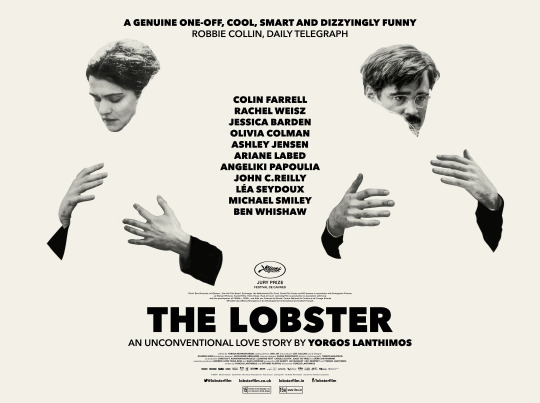
The Lobster is a satire on the systematic and emotionless approach many people take to finding love. In an alternate reality where being single is outlawed, one would think that loneliness would be hard to come by. However, the characters at the forefront of our story inhabit a constant state of cold and stark isolation, even when they do find love, whether it be organically or manufactured. In this world however, love in all it’s forms is quantified, measured and heavily scrutinized, like some sort of product on an assembly line. The tone this film presents is one of prevailing melancholia which aches with solitude. The lines are delivered with zero inflection or emotion, yet still demonstrate the eccentric sense of dry humor at the core of the story. On concept alone this film is one of the best offerings of 2016, but is bumped to the next level with strong and nuanced performances and clever writing.
- Karrie Lyles
The Top 10 Movies of 2016
Alright, well, here we go.
No more putting it off, here is our top 10 movies of 2016:
10. Zootopia
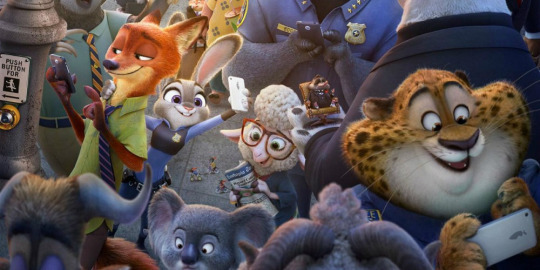
Zootopia is an original animated film put together by the folks over at Walt Disney Animation Studios that refuses to talk down to its primary audience, children. It’s a film that fits the bill of a colorful and lively Disney romp for children, but it also sands alone as a smart, technically impressive, and fantastical film. In a year with a lot of animated films of varying quality, Zootopia is not only one of the best animated films of 2016, but one that will probably stand the test of time.
- Jurge Cruz-Alvarez
9. The Jungle Book
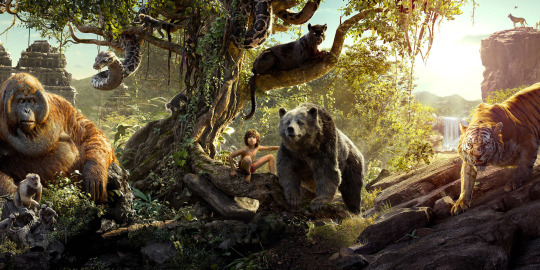
It’s easy to say that the film industry is over-saturated with remakes and sequels that are uninspired and unnecessary. However, when it comes to Jon Favreau’s journey into the Disney classic The Jungle Book, there’s nothing tired about it. The story has newfound power and mastery leaving behind any conceptions that it’s nothing more than a movie for kids. Propelled ahead of other talking animal movies by the amazing performances of the leading cast and the beautiful atmosphere created in the landscape of the film, The Jungle Book is a stellar experience.
- Karrie Lyles
8. Arrival
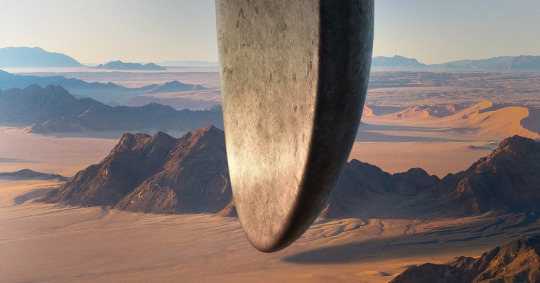
Arrival is fresh. Of the films in its genre that have released in the past five years, Arrival is one of the best, if not the best. It tells its story in an eerie, mysterious, and well, alien way. Its style is haunting and its performance from its lead Amy Adams is strong. While some story threads are connected in a questionable fashion, it’s one that works well and leaves the audience with nuanced questions.
- Jurge Cruz-Alvarez
7. Southbound
youtube
Southbound has proven itself not only as a unique and unforgettable horror romp, but also as a test of endurance. An amalgamation of brutality, unease, and terror, this anthology horror film enters the list as an exciting and stylized plunge into purgatory in the form of the open road. Five stories are laced loosely but effectively together by the desolate stretch of highway, the radio host encouraging the driver, and the omnipresent sense of dread. The many facets of this film, from the dissonant and purposeful soundtrack to the haunting design of the creatures, establish an isolated world that seems to have an agenda all its own. Would it be too cheesy to say buckle up?
- Karrie Lyles
6. The Neon Demon
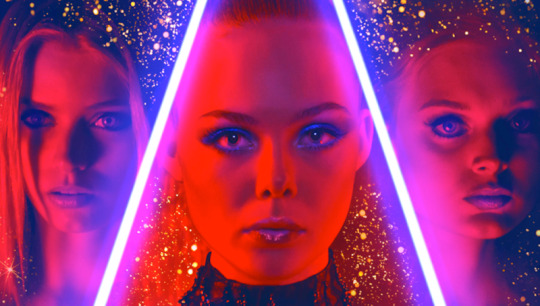
A film as divisive as it is stylish. The Neon Demon creates a beautiful fantasy world that slowly morphs into a vaporwave nightmare. Some will fall in love with it, others will despise it, and many will find themselves fluctuating in between. It’s unique nature is worth the watch to see which end of the spectrum you fall on.
- Ryan Lance
5. Rouge One: A Star Wars Story
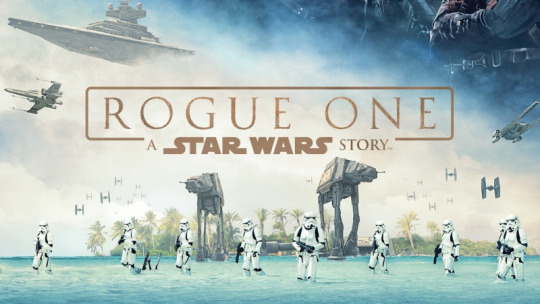
As outrageous as it might sound, Rogue One wound up being a grounded film; certainly when compared to other films in the franchise. Its focus on a group of nobodies who are truly presented as a group of nobodies, and the clever ways it ties itself to A New Hope gives the conflict of the original three Star Wars films a new sense of humanity and weight. While it certainly has some fat around the edges, that does not stop Rogue One from being a strong action sci-fi film.
As someone who thinks A New Hope stands alone and is the best thing to have the name Star Wars, I was happy to see this film successfully enrich such a classic.
- Jurge Cruz
4. Green Room
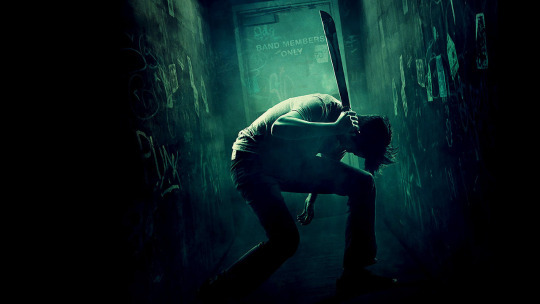
Green Room’s relatively simple premise sets up a brutal thriller that keeps you invested all the way through. It’s a violent and gritty ride you’ll be watching while curled into a ball on your couch (At least I was). With some outstanding performances from Patrick Stewart and the late Anton Yelchin, Green Room is a must watch for all fans of the thriller genre.
- Ryan Lance
3. Swiss Army Man
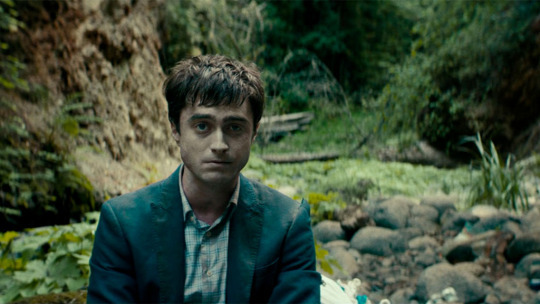
Swiss Army Man is one of those films where the people who talk about it always seem to be compelled to throw in a “where do I begin?” or a “you have to see it to believe it” or something of similar awestruck yet confused wonder. An unflinching look at what constitutes a full life. This film breaks down what fuels and perpetuates societal shame and illustrates what an imposition decency can be.The devastating reality of a suicidal man having to convince someone how beautiful and fulfilling it is to be alive. Born from what the directors, Daniels, hate most in film; bodily humor, acapella music, and musicals, comes a heartfelt and wonderfully crafted film that you just can’t get out of your head.
- Karrie Lyles
2. 10 Cloverfield Lane
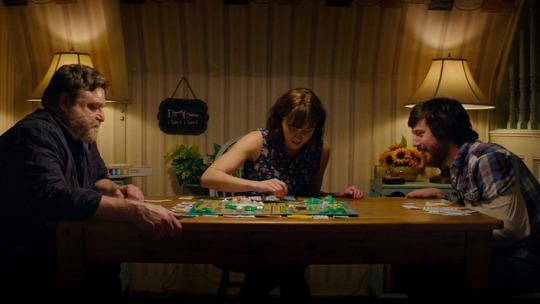
10 Cloverfield Lane leaves you feeling as claustrophobic as its characters, with tension rising the longer you are trapped in there. This type of psychological thriller isn’t one you come across often, as it plays with your fears and anxiety in thoughtful ways similar films fail at. Add in some fantastic performances by the small cast of Mary Elizabeth Winstead, John Goodman, and John Gallagher Jr., and 10 Cloverfield Lane is a film I’d recommend to anyone.
- Ryan Lance
And finally…
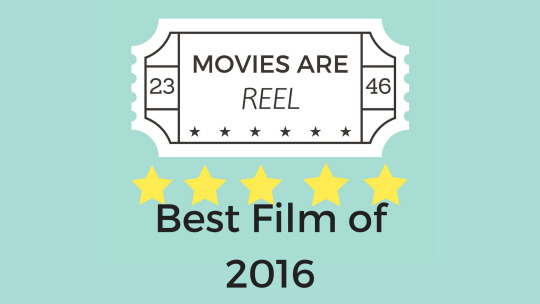
1. The Witch
youtube
The Witch was one of our most anticipated films of this year, and there was certainly some skepticism if it could live up to the excitement we ourselves built up for it. It was clear that it was a horror film of a different species, one slower and very deliberate.
I personally was worried that it would turn out as a plodding film with a lot of ambition.
But The Witch delivers. It’s an unsettling film with unforgettable imagery and a fascinating dissection of a family and their inner politics. Its lead character, played Anya Taylor-Joy, is probably one of the most complicated and multifaceted characters in the history of horror. The growth she goes through is one that challenges critical thought while still being gripping.
Its ending is also pretty darn fun.
It’s because of this that it is our movie of the year.
- Jurge Cruz
Personal Lists
Well, that was a lot of work. Now that the weight is off our backs, let’s get a bit more casual.
Here are our top three films of 2016,
Karrie’s Top Three Movies of 2016:
1. Swiss Army Man (Karrie already talked about it on the list)
2. Southbound (Karrie already talked about it on the list)
3. Gods of Egypt
Some people just want to watch the flat Earth burn, or be attacked by a giant space snake. I get it, OK? This movie is hot garbage BUT, it’s the best and hottest garbage in all the land. Somewhere along the line of making fun of this movie constantly, I found myself genuinely liking it. The chorus of characters that are shallow and unlikable, the metallic humanoid CGI battle bots, the fact that post Pirates of the Caribbean Geoffrey Rush is condemned to be a disgruntled sea captain forever, it’s a bottomless pit of things that you should never do in a film, but THIS film has the gumption to not only do all of them, but to sequel bait at the end. This movie is pure gold just like the blood that runs through the veins of the slightly above average sized gods who walk among us. Even if it’s for all the wrong reasons Gods of Egypt is one of my favorite films of 2016.
- Karrie Lyles
Jurge’s Top Three Movies of 2016:
1. The Witch (Jurge already talked about it on the list)
2. Green Room
From my review
“Green Room is a compact and human horror thriller. Its tension is so high because it respects its young cast and makes them human. The violence it is so good at displaying hits hard and adds to that tension. For a movie about a bunch of kids getting picked off one by one, it is really, really smart. Apart from two notable exceptions, its characters aren’t all that likable or memorable, but you can still buy into them. They aren’t obnoxious. They are people. That’s why it’s a cut above a lot of films in the genre, and why it’s one of 2016’s best films.”
- Jurge Cruz-Alvarez
3. Rogue One: A Star Wars Story (Jurge already talked about it on the list)
So, that’s 2016. If you have read this or have given any of our content any attention, thank you. It means a lot. We’re excited to jump into 2017 and hope to keep the podcast going strong.
Here’s hoping January is a strong start.
Ryan’s Top Three Movies of 2016:
1. 10 Cloverfield Lane (Ryan already talked about it on the list)
2. The Witch
3. The Neon Demon
----------------------------------------------------------------------------------------------------
Jurge:
twitter: https://twitter.com/suparherojar26
blog: http://jcruzalvarez.tumblr.com/
Ryan
twitter: https://twitter.com/fryanpans
blog: http://freezevolt.tumblr.com/
Karrie
twitter: https://twitter.com/kar_elyles
blog: sylvia-socioplath.tumblr.com
#best movies of 2016#best of 2016#top 10 movies of 2016#green rrom#the witch#the neon demon#rogue one#zootopia#the lobster#the inviation#arrival#soutbound#swiss army man#movie talk#movie discussion#movies#film#podcast#feature
18 notes
·
View notes
Text
‘The Good Place’ Finale Finds the Meaning of Life: ‘Yep, Nailed It’
Michael Schur swears he didn’t name Michael, the avuncular architect played by Ted Danson on Schur’s metaphysical sitcom, “The Good Place,” after himself. The character was actually based on St. Michael the Archangel, who according to Christian tradition is involved in the final judgment of souls.
But the parallels are undeniable. Over four seasons on the NBC comedy, both Michaels spent their time devising elaborate, twisty fictions and trying to settle on a suitably just plan for the afterlife.
“That character is some sort of a showrunner — he’s writing scenarios and putting people in different positions,” Schur said recently. “I gave up trying to argue and have just accepted the fact that my subconscious will live on the show.”
“The Good Place” is ending this week, wrapping up Thursday night on NBC with the series finale followed by a live panel discussion, hosted by Seth Meyers, with Schur and the cast — Danson, Kristen Bell, William Jackson Harper, Jameela Jamil, Manny Jacinto and D’Arcy Carden.
The concept for the series began with Schur’s ideas about a standard for divine justice — a point system measuring earthly behavior — that led to a deeper dive into moral philosophy before ending up as a bright, heady mix of puns, cartoonish tortures (chain saw bears, a particularly invasive species of spider) and wide-ranging inquiries into the nature of human goodness.
The problems with the point system quickly became apparent, a pattern that repeated itself over and over, onscreen and off, as the writing staff wrestled with both the story and their own notions about ethics and metaphysical reward. Last week’s penultimate episode found the core group finally reaching the actual Good Place, only to find that it, too, had its flaws.
“We never felt like we had a better idea than anybody else,” Schur said.
But they did come to some conclusions. In a telephone interview, Schur discussed them, the show’s inadvertent political parallels and, yes, those pesky spiders. These are edited excerpts from the conversation.
(Note: While Schur wouldn’t discuss the series finale, this interview includes spoilers for earlier episodes of “The Good Place” as well as, weirdly, “Star Wars: The Rise of Skywalker.”)
Your original point system quickly fell apart. So did you figure it all out by the end?
Yep, nailed it. [Laughs.] The second you conceive of any system of what happens after you die, you then realize, oh, there’s a million flaws with this. The history of philosophy is people saying, “Hey, you know how we believe this? Well guess what, this sucks — we’ve got to revise it.” This show is no different. We were constantly proposing theories and then realizing how flawed they were.
Does the finale offer any kind of answer?
I don’t know that we have an answer, but the show ended up taking a position, and it’s something close to Aristotelian virtue ethics. What matters is that these things matter to you. You’re going to fail over and over again, and you’re going to encounter decisions that have no answer. Anything you do is problematic and causes someone somewhere some amount of pain or sadness or suffering.
And because you’re doomed to fail, what matters isn’t that you do everything right. What matters is that you try. When you make a mistake, you apologize and then you try something else. The show is suggesting that the real victory of being alive is just putting these things in the front of your brain and attempting all the time to be a better person than you were yesterday.
The culture is full of people who seem to be attempting the opposite. You’ve been outspoken about political issues, in particular, were you ever tempted to incorporate more pointed satire within the show?
No, for two reasons. No. 1, the characters all died before the 2016 election, so we got off on a technicality. Granted they did later un-die and go back to Earth, but we never had to mention Donald Trump’s name because they lived in blissful ignorance of the fact that he had been elected.
But the more important reason was you end up making political comments without directly making political comments, by discussing the nature of moral philosophy. When they’re redesigning the afterlife in the ninth episode of this season, the problem they identify is that people can commit crimes that aren’t by their essence cruel, and yet they’re punished in a way that is cruel, and that asymmetry is problematic.
What we’re talking about is mass incarceration. We’re not trying to — we’re talking about this ridiculous afterlife system that we invented, but this is a direct analogue to the problem of mass incarceration. We realized early on that in discussing any set of moral problems, even in the extreme abstract, you’re going to end up running alongside the car of some modern-day issue.
That said, there have been jabs implied by, say, the spinelessness of the Good Place Committee.
That’s the most pointed we ever got. That’s just pure frustration with a certain kind of politician who holds the concept of fairness and making people on the opposite side of the aisle feel good above all else, including just the basic fight for what is right and good. So yeah, that is a bit of an ax-grinding exercise.
Do you think the show had a villain? Even a guy like the überdemon Shawn (Marc Evan Jackson) has a growing self-awareness by the end.
In a tangible, TV-character way, Shawn was the villain. But I think the villain of the show, if there is one, is probably something like a belief that you’re special, or that you don’t have to follow rules or that your problems are bigger than someone else’s. Everyone in the show had some kind of personal Achilles’ heel — for Eleanor it was selfishness, for Chidi it was indecision and for Tahani it was glory-seeking. All of those things are related to the same thing, which is self-obsession.
The show was still a comedy, of course, and some of the funniest lines involved the Bad Place’s creative torture methods. Did you have any favorites?
The ones that were the silliest. Butthole spiders came up over and over again — I don’t know who pitched that the first time, but that became our baseline. The tricky thing about talking about torture is it’s the least funny subject in the world. So it always had to be really silly, like chain saw bears.
But my favorite ones were more specific. Like there’s a joke where Shawn gets zapped into a room and he looks around and he says, “Oh, dammit, I was right in the middle of torturing William Shakespeare by describing the plot of the ‘Entourage’ movie.” That one I loved. There was also one in those webisodes we made where he’s torturing Emily Dickinson by playing her the Joe Rogan podcast.
That’s a delicious treat to give a writers’ room: “We need 50 things that Shawn could be doing right now.” We would write 25 of them in about 40 seconds and then pick our favorite.
The story was tightly serialized and got pretty convoluted. What was the hardest thing to pull off?
I had never worked on a show that had a giant concept behind it. Giant concepts are great for pilots and terrible for shows because once you’re past the giant concept, it’s like, well what the hell happens now?
So I didn’t even pitch the show until I knew what the whole first season was, because you can’t maintain a consistent world for too long unless you know where you’re going at all times. If you don’t know, you’re going to do something at some point that derails you or that becomes inconsistent in the long term.
For example, in the last “Star Wars” movie when J.J. Abrams was trying to course-correct for the previous movie, the opening crawl says “Palpatine is alive” and you’re like, “What’s he talking about? Palpatine hasn’t been in the story at all.” And now this whole story is about Palpatine. Those three movies weren’t broken as one giant thing, so they had to bluntly knock stuff aside that didn’t fit into where they wanted to end up.
The “Star Wars” comment is going to be the one thing here that goes viral.
I don’t know why we’re talking about “Star Wars” now, but I guess it’s my fault. Look, I will see every “Star Wars” movie that’s ever made, but it is a little jarring when they have to explain stuff in a direct way like that. Say what you want about George Lucas’s movies, but at least he was executing a certain vision.
Because we were a year ahead at the beginning, that let us be a year ahead every year. By the time we started the first episode of any season, we already knew what the last episode of that season was going to be, so we didn’t ever do anything that was wildly inconsistent or that had to be maneuvered around. That was the hardest part of it, and also the most necessary part of making the show.
In what ways did “The Good Place” evolve that were surprising to you?
Well, there was a gigantic evolution of what the show actually believed, which was interesting. I wrote this long document to all the writers at the beginning that laid out the stuff I’d been reading and the basic ideas we’d be discussing. And I wrote a note that basically said, “At some point this show needs to figure out what it believes. There’s a lot of theories out there and they’ve been discussed for thousands of years, and if things work out and we stick around long enough, the show has to take a position.”
But I didn’t know what that position was going to be. So what ended up happening was by writing the stories and figuring out what interested us as a group, the show ended up having a philosophy about what matters. And that was really fun — it felt like a four-year conversation among a lot of really smart and funny people about what’s the best way to just approach the impossibility of being alive. And that was delightful.
from WordPress https://mastcomm.com/the-good-place-finale-finds-the-meaning-of-life-yep-nailed-it/
0 notes
Text
‘The Good Place’ Finale Finds the Meaning of Life: ‘Yep, Nailed It’
Michael Schur swears he didn’t name Michael, the avuncular architect played by Ted Danson on Schur’s metaphysical sitcom, “The Good Place,” after himself. The character was actually based on St. Michael the Archangel, who according to Christian tradition is involved in the final judgment of souls.
But the parallels are undeniable. Over four seasons on the NBC comedy, both Michaels spent their time devising elaborate, twisty fictions and trying to settle on a suitably just plan for the afterlife.
“That character is some sort of a showrunner — he’s writing scenarios and putting people in different positions,” Schur said recently. “I gave up trying to argue and have just accepted the fact that my subconscious will live on the show.”
“The Good Place” is ending this week, wrapping up Thursday night on NBC with the series finale followed by a live panel discussion, hosted by Seth Meyers, with Schur and the cast — Danson, Kristen Bell, William Jackson Harper, Jameela Jamil, Manny Jacinto and D’Arcy Carden.
The concept for the series began with Schur’s ideas about a standard for divine justice — a point system measuring earthly behavior — that led to a deeper dive into moral philosophy before ending up as a bright, heady mix of puns, cartoonish tortures (chain saw bears, a particularly invasive species of spider) and wide-ranging inquiries into the nature of human goodness.
The problems with the point system quickly became apparent, a pattern that repeated itself over and over, onscreen and off, as the writing staff wrestled with both the story and their own notions about ethics and metaphysical reward. Last week’s penultimate episode found the core group finally reaching the actual Good Place, only to find that it, too, had its flaws.
“We never felt like we had a better idea than anybody else,” Schur said.
But they did come to some conclusions. In a telephone interview, Schur discussed them, the show’s inadvertent political parallels and, yes, those pesky spiders. These are edited excerpts from the conversation.
(Note: While Schur wouldn’t discuss the series finale, this interview includes spoilers for earlier episodes of “The Good Place” as well as, weirdly, “Star Wars: The Rise of Skywalker.”)
Your original point system quickly fell apart. So did you figure it all out by the end?
Yep, nailed it. [Laughs.] The second you conceive of any system of what happens after you die, you then realize, oh, there’s a million flaws with this. The history of philosophy is people saying, “Hey, you know how we believe this? Well guess what, this sucks — we’ve got to revise it.” This show is no different. We were constantly proposing theories and then realizing how flawed they were.
Does the finale offer any kind of answer?
I don’t know that we have an answer, but the show ended up taking a position, and it’s something close to Aristotelian virtue ethics. What matters is that these things matter to you. You’re going to fail over and over again, and you’re going to encounter decisions that have no answer. Anything you do is problematic and causes someone somewhere some amount of pain or sadness or suffering.
And because you’re doomed to fail, what matters isn’t that you do everything right. What matters is that you try. When you make a mistake, you apologize and then you try something else. The show is suggesting that the real victory of being alive is just putting these things in the front of your brain and attempting all the time to be a better person than you were yesterday.
The culture is full of people who seem to be attempting the opposite. You’ve been outspoken about political issues, in particular, were you ever tempted to incorporate more pointed satire within the show?
No, for two reasons. No. 1, the characters all died before the 2016 election, so we got off on a technicality. Granted they did later un-die and go back to Earth, but we never had to mention Donald Trump’s name because they lived in blissful ignorance of the fact that he had been elected.
But the more important reason was you end up making political comments without directly making political comments, by discussing the nature of moral philosophy. When they’re redesigning the afterlife in the ninth episode of this season, the problem they identify is that people can commit crimes that aren’t by their essence cruel, and yet they’re punished in a way that is cruel, and that asymmetry is problematic.
What we’re talking about is mass incarceration. We’re not trying to — we’re talking about this ridiculous afterlife system that we invented, but this is a direct analogue to the problem of mass incarceration. We realized early on that in discussing any set of moral problems, even in the extreme abstract, you’re going to end up running alongside the car of some modern-day issue.
That said, there have been jabs implied by, say, the spinelessness of the Good Place Committee.
That’s the most pointed we ever got. That’s just pure frustration with a certain kind of politician who holds the concept of fairness and making people on the opposite side of the aisle feel good above all else, including just the basic fight for what is right and good. So yeah, that is a bit of an ax-grinding exercise.
Do you think the show had a villain? Even a guy like the überdemon Shawn (Marc Evan Jackson) has a growing self-awareness by the end.
In a tangible, TV-character way, Shawn was the villain. But I think the villain of the show, if there is one, is probably something like a belief that you’re special, or that you don’t have to follow rules or that your problems are bigger than someone else’s. Everyone in the show had some kind of personal Achilles’ heel — for Eleanor it was selfishness, for Chidi it was indecision and for Tahani it was glory-seeking. All of those things are related to the same thing, which is self-obsession.
The show was still a comedy, of course, and some of the funniest lines involved the Bad Place’s creative torture methods. Did you have any favorites?
The ones that were the silliest. Butthole spiders came up over and over again — I don’t know who pitched that the first time, but that became our baseline. The tricky thing about talking about torture is it’s the least funny subject in the world. So it always had to be really silly, like chain saw bears.
But my favorite ones were more specific. Like there’s a joke where Shawn gets zapped into a room and he looks around and he says, “Oh, dammit, I was right in the middle of torturing William Shakespeare by describing the plot of the ‘Entourage’ movie.” That one I loved. There was also one in those webisodes we made where he’s torturing Emily Dickinson by playing her the Joe Rogan podcast.
That’s a delicious treat to give a writers’ room: “We need 50 things that Shawn could be doing right now.” We would write 25 of them in about 40 seconds and then pick our favorite.
The story was tightly serialized and got pretty convoluted. What was the hardest thing to pull off?
I had never worked on a show that had a giant concept behind it. Giant concepts are great for pilots and terrible for shows because once you’re past the giant concept, it’s like, well what the hell happens now?
So I didn’t even pitch the show until I knew what the whole first season was, because you can’t maintain a consistent world for too long unless you know where you’re going at all times. If you don’t know, you’re going to do something at some point that derails you or that becomes inconsistent in the long term.
For example, in the last “Star Wars” movie when J.J. Abrams was trying to course-correct for the previous movie, the opening crawl says “Palpatine is alive” and you’re like, “What’s he talking about? Palpatine hasn’t been in the story at all.” And now this whole story is about Palpatine. Those three movies weren’t broken as one giant thing, so they had to bluntly knock stuff aside that didn’t fit into where they wanted to end up.
The “Star Wars” comment is going to be the one thing here that goes viral.
I don’t know why we’re talking about “Star Wars” now, but I guess it’s my fault. Look, I will see every “Star Wars” movie that’s ever made, but it is a little jarring when they have to explain stuff in a direct way like that. Say what you want about George Lucas’s movies, but at least he was executing a certain vision.
Because we were a year ahead at the beginning, that let us be a year ahead every year. By the time we started the first episode of any season, we already knew what the last episode of that season was going to be, so we didn’t ever do anything that was wildly inconsistent or that had to be maneuvered around. That was the hardest part of it, and also the most necessary part of making the show.
In what ways did “The Good Place” evolve that were surprising to you?
Well, there was a gigantic evolution of what the show actually believed, which was interesting. I wrote this long document to all the writers at the beginning that laid out the stuff I’d been reading and the basic ideas we’d be discussing. And I wrote a note that basically said, “At some point this show needs to figure out what it believes. There’s a lot of theories out there and they’ve been discussed for thousands of years, and if things work out and we stick around long enough, the show has to take a position.”
But I didn’t know what that position was going to be. So what ended up happening was by writing the stories and figuring out what interested us as a group, the show ended up having a philosophy about what matters. And that was really fun — it felt like a four-year conversation among a lot of really smart and funny people about what’s the best way to just approach the impossibility of being alive. And that was delightful.
from WordPress https://mastcomm.com/the-good-place-finale-finds-the-meaning-of-life-yep-nailed-it/
0 notes